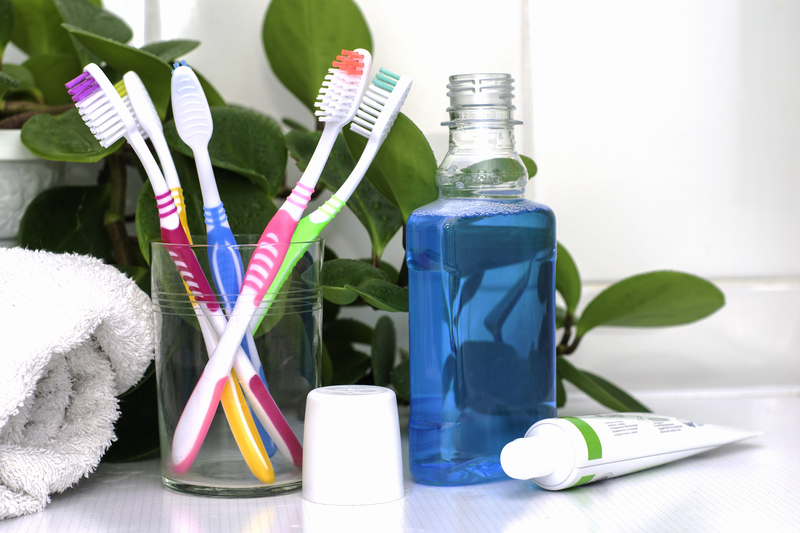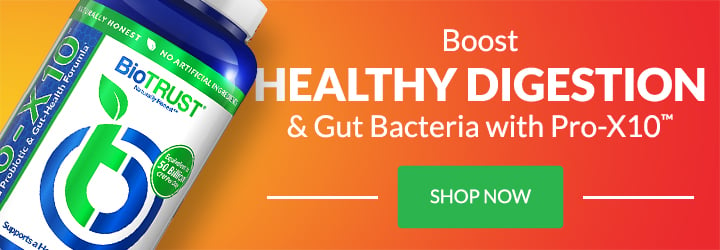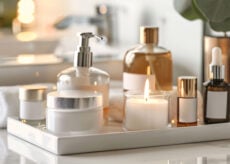Is Mouthwash Bad for You? See the Science

Dental hygiene isn’t only important for keeping your pearly whites pearly, but for overall health. Of course, the importance of brushing your teeth at least twice a day and flossing daily is well known. But what about using mouthwash? Is mouthwash bad for oral health, or is it worth the extra time and expense?
Like so many health questions, it depends. There are pros and cons of using mouthwash.
The Pros of Mouthwash
According to advertisements, 30 seconds of swishing mouthwash in your mouth will make your teeth whiter, your gums healthier, and stop bad breath in its tracks. Some can even help prevent cavities, they tell us. And many people enjoy the fresh, clean feeling a morning or evening swish provides.
Research does indicate that mouthwash can:
- Freshen breath
- Help prevent bad breath
- Decrease the risk of gum disease (e.g., gingivitis)
- Reduce the buildup of plaque
- Potentially prevent cavities
- Whiten teeth
- And remove bacteria from between the teeth 1-6
That said, no matter how good your mouthwash is, it can never beat out a regular routine of brushing and flossing correctly. If the question is, “Is mouthwash bad to use in place of brushing and flossing,” the answer is absolutely yes.
There are, however, times when mouthwashes are recommended. If your dentist prescribes rinsing for a specific condition, please follow their advice. Common reasons oral rinses are prescribed include:
- Dry mouth
- Gum disease (for both treatment and prevention)
- Pain relief for sores in the mouth (e.g., ulcers or canker sores)
- Infection prevention after oral surgery or a tooth extraction.
The Cons of Mouthwash
While there’s a time and a place for using mouthwash, there are also downsides of using it. 7
For one, mouthwash often is made with alcohol as a preservative and antiseptic. Alcohol can be drying, cause a burning sensation in the mouth, and irritate canker sores. Yet you need to ensure you have enough saliva in the mouth as saliva helps break down food. Plus, saliva supports the process of tooth remineralization and helps prevent cavities.
Another problematic ingredient is sodium lauryl sulfate (SLS). This compound is added because it causes foaming or lathering many people associate with cleaning. Unfortunately, SLS can irritate the mouth, especially if you have any canker sores.
Some mouthwashes have also been found to stain the teeth, especially those that contain the prescription-only ingredient chlorhexidine (CHX), which some research also suggests is only mildly effective. 8 In addition, brightly colored dyes (often blue or green) often found in over-the-counter mouthwashes may also discolor the teeth. 9
Another common complaint with mouthwashes is that they can lead to changes in taste as well as abnormal sensations in the mouth, especially with longer-term use. 9
One of the biggest concerns with mouthwash or oral rinses, though, is that they may work too well. That is, they’re designed to kill the bacteria that lead to bad breath. In fact, some popular mouthwashes even state on their labels that they kill 99.9% of all bacteria. In other words, they can kill off not just the bad bacteria that can cause bad breath and plaque buildup. They also kill off the healthy microbiome, which provides enzymes to break down the food you eat as part of digestion as well as other strains that help maintain strong, healthy teeth and gums.
Indeed, a healthy oral microbiome is needed to help prevent cavities, gingivitis, and bad breath. So those potent mouthwashes may be doing more harm than good—and even increase the risk of tooth decay.
In addition, recent research has found that this imbalance of the mouth microbiome can disrupt the production of nitric oxide (NO), a molecule that is needed for the proper regulation of blood pressure. 10, 11
Some research also has associated the frequent, long-term use of mouthwashes with an increased risk of cancer of the head and neck due to the alcohol found in many rinses. 12, 13 More research is needed, though, as there were significant limitations of the study.
So, Is Mouthwash Bad?
How good or bad mouthwash is is likely determined more by the type and ingredients and how often you use it. Common ingredients that cause concern include:
- Alcohol—some mouthwashes contain ~26% alcohol as ethanol, which dries the mouth and makes bad breath worse
- Chlorine Dioxide—a bleaching agent that kills bacteria indiscriminately
- Chlorhexidine—an antiseptic
- Cocomidopropyl betaine—which causes products to foam or lather
- Parabens—which can disrupt the endocrine system
- Formaldehyde—for obvious reasons
- Saccharin—an artificial sweetener that may also disrupt the oral microbiome.
While you may be tempted to rinse your mouth several times throughout the day with mouthwash, especially after eating when you don’t have your toothbrush handy, overuse can lead to unpleasant side effects, such as:
- Inflammation in the mouth, especially if you have any sores
- Bleeding gums
- Dry mouth
- Increased pain or sensitivity
- Stained teeth.
Conventional mouthwash also should be avoided completely by some individuals, such as:
- Children under 6 years old
- People with open sores in the mouth
- Those with compromised immune systems
- And people who are undergoing chemotherapy
LIMITED TIME OFFER: Get Ageless Turmeric, Our Highly-Bioavailable Turmeric & Ginger Supplement, As Low As $14
It’s also possible to develop an allergy to some of the ingredients common in mouthwash, such as SLS, xylitol, flomenthol, chlorhexidine, and specific essential oils. If you do have allergies, make sure you read the label carefully, so you can avoid the use of those ingredients.
Healthy Mouthwash Alternatives
We all want to have a fresh, clean mouth and sweet-smelling breath. That starts with a regular hygiene routine of brushing and flossing. If you want to take it a step further, you may want to add mouthwash occasionally.
The quality, ingredients, and recommended use can differ greatly, and there are other types of mouthwash to consider. When choosing a mouthwash, consider avoiding those that contain alcohol, which destroys the friendly bacteria, dries out the mouth, and can even increase the risk of cavities.
Other ingredients to avoid include chlorine dioxide, which may be added as a whitening agent, chlorhexidine, a common antiseptic, and formaldehyde, which may increase the risk of respiratory issues as well as cancer.
Some popular alternative oral rinses include:
- Therabreath, an alcohol-free mouthwash. It’s made with aloe vera, tea tree oil, and other natural, non-burning ingredients. It’s also free of dyes, perfume, detergent, and other harsh additives. Yet it’s very effective for freshening the breath and improving the pH of the mouth to help reduce the erosion of enamel and prevent tooth sensitivity.
- The Natural Dentist, made with 20% aloe vera and other gentle, natural ingredients without any harsh chemical additives like alcohol, synthetic colors, flavors, or sweeteners.
- Lumineux Oral Essentials, which is highly recommended for people who have bad breath due to a dry mouth. It contains aloe vera as well as dead sea salt and xylitol to promote oral health. It also was designed by a dentist to keep the microbiome in balance for a healthier smile. (Just make sure you keep it away from pets as xylitol is safe for humans but highly toxic for dogs.)
You can also make your own gentle mouthwash at home with water, aloe vera, an essential oil (such as anise), green tea, turmeric, sea salt and baking soda, or calcium carbonate.
Of course, if you do have any dental concerns, the best place to go is to a trusted dentist who can provide the best advice for you and your personal dental health.




 7 Signs Your Body is Seriously Low on Collagen (not just wrinkles)
7 Signs Your Body is Seriously Low on Collagen (not just wrinkles) Health Expert: "Turmeric Doesn't Work (unless...)"
Health Expert: "Turmeric Doesn't Work (unless...)" 3 Warning Signs Your Probiotic Supplement is a Total Waste
3 Warning Signs Your Probiotic Supplement is a Total Waste

